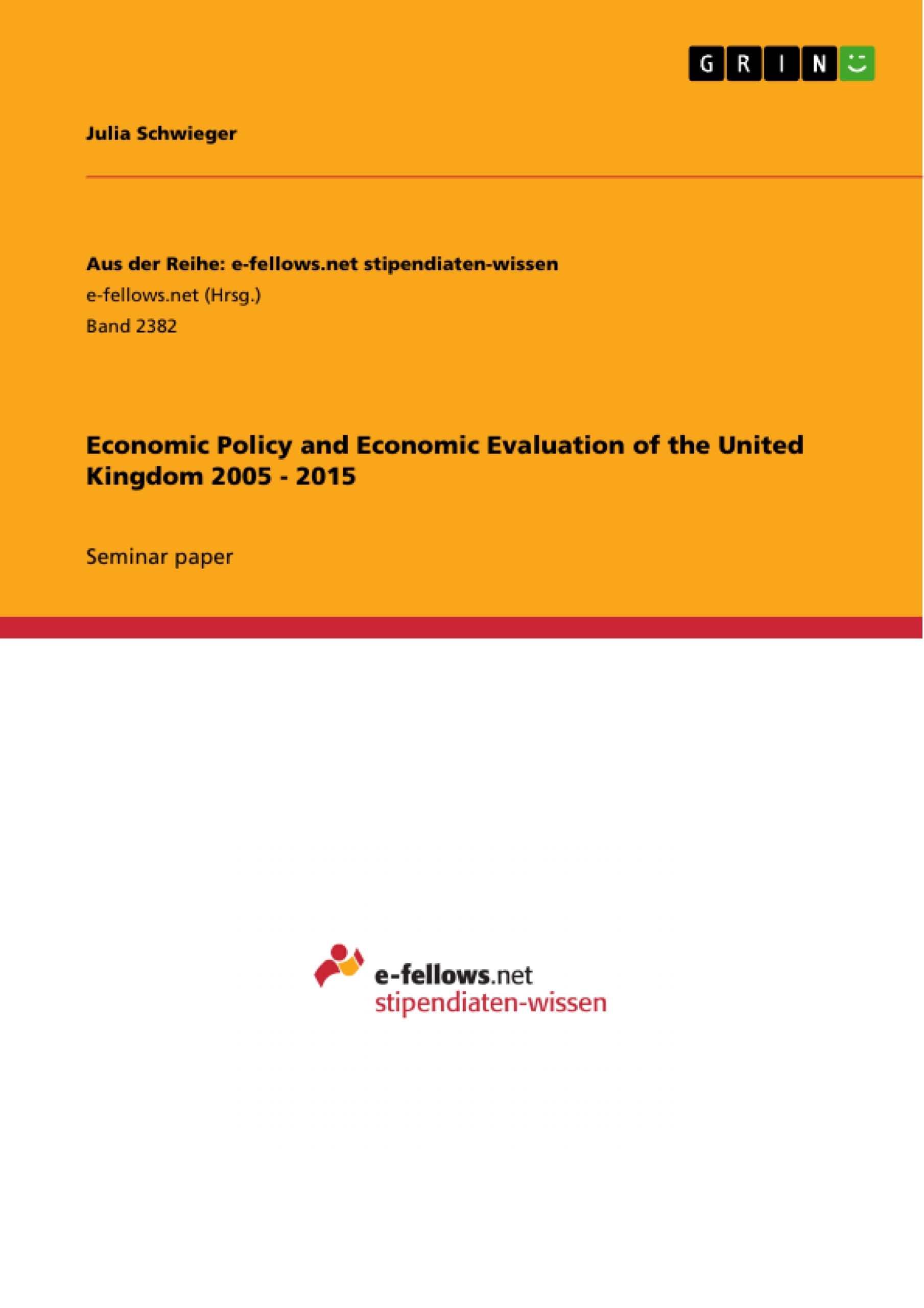In a globalizing world with increasing international trade and growing markets as well as crisis influencing countries worldwide, it becomes ever more important to evaluate and compare the economic performance of different nations as well as their impacts on each other.
One method that allows assessing a country’s macroeconomic performance is the "magic square" according to Kaldor (1971). This approach takes four variables into consideration, which should be pursued amongst an economy:
1. Sustainable growth,
2. Equilibrium of balance of payments,
3. Price stability,
4. High employment.
In the following paper, the economic progress of the United Kingdom within the previous 10 years should be evaluated using the "magic square" as a framework. Therefore, there will be the main focus on the most relevant macroeconomic indicators, such as the growth of GDP, inflation rate, unemployment rate and current account balance, in order to provide a sound overview regarding UK’s overall economic development.
Inhaltsverzeichnis (Table of Contents)
- Introduction
- Economic Growth - GDP
- GDP of the United Kingdom 2005-2015
- Price stability - Inflation rate
- Inflation rate United Kingdom 2005-2016
- Unemployment
- Unemployment UK
- Okun's Law UK
- Balance of payments - Current account balance
- Current account balance UK
- Other macroeconomic indicators
- Exchange rate
- Openness
- Debt to GDP
- Conclusion
Zielsetzung und Themenschwerpunkte (Objectives and Key Themes)
This paper aims to evaluate the economic performance of the United Kingdom over the past 10 years using the "magic square" approach by Kaldor (1971). The primary focus will be on key macroeconomic indicators such as GDP growth, inflation rate, unemployment rate, and current account balance. This analysis seeks to provide a comprehensive overview of the UK's overall economic development. The key themes of this paper include:- Assessing the UK's macroeconomic performance through the "magic square" framework
- Analyzing key macroeconomic indicators like GDP growth, inflation rate, unemployment, and current account balance
- Exploring the impact of global economic trends and crises on the UK's economic development
- Gaining insights into the factors influencing the UK's economic progress over the past decade
Zusammenfassung der Kapitel (Chapter Summaries)
- Introduction: This chapter introduces the concept of the "magic square" framework, which analyzes economic performance based on four key variables: sustainable growth, equilibrium of balance of payments, price stability, and high employment. It highlights the relevance of evaluating the UK's economic performance within a global context.
- Economic Growth - GDP: This chapter focuses on the analysis of the UK's GDP growth over the past decade, providing insights into the trends and factors influencing economic expansion.
- Price Stability - Inflation Rate: This chapter examines the inflation rate in the UK, discussing its impact on the economy and analyzing its relationship to key macroeconomic indicators.
- Unemployment: This chapter analyzes the unemployment rate in the UK, exploring its relationship to economic growth and examining the effectiveness of policies implemented to address unemployment.
- Balance of Payments - Current Account Balance: This chapter examines the UK's current account balance, analyzing its trends and exploring the factors contributing to its performance.
- Other Macroeconomic Indicators: This chapter provides insights into additional macroeconomic indicators such as the exchange rate, openness, and debt to GDP, providing a more comprehensive understanding of the UK's economic health.
Schlüsselwörter (Keywords)
This paper explores key economic concepts such as economic performance, macroeconomic indicators, "magic square" framework, GDP growth, inflation rate, unemployment rate, current account balance, global economic trends, and the UK's economic development. These keywords highlight the focus on evaluating the UK's economic performance using a comprehensive approach that considers various economic factors.- Quote paper
- Julia Schwieger (Author), 2016, Economic Policy and Economic Evaluation of the United Kingdom 2005 - 2015, Munich, GRIN Verlag, https://www.grin.com/document/369444




